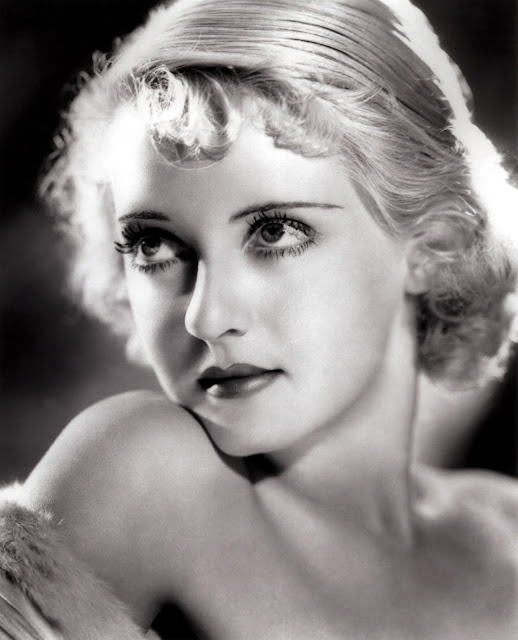"It’s very cruel to discover one’s mediocrity only when it’s too late.”
That is one of the opening lines of the 1934 film Of Human Bondage. Thus begins one of the
most depressing movies of all time. The story is not just depressing; it’s
melodramatic to the point of frustration and eye-rolling. Yet, despite the
overdone drama there is still a reason to watch this movie; the incredible
Bette Davis.
 |
| Of Human Bondage movie poster. Via. |
Fiery, passionate, and strong-willed as ever, Bette Davis
takes on the role of the cold-hearted, opportunistic, and incredibly
unsympathetic Mildred Rogers. The (initially) pretty, yet unfeeling
middle-class waitress becomes the object of Philip Carey (Leslie Howard)’s
obsession. This is where the film gets frustrating; despite her immediate and
unwavering disinterest, Philip continues to pursue Mildred. Time and time
again, Mildred ditches, dumps, uses, abuses, and makes fun of Philip; not once
does she act the slightest bit
interested in him. Yet he continues to follow her, never giving up on his
so-called love. She is his ‘human bondage’- she’s the burden that he can’t
escape and is preventing him from achieving any sort of success or happiness. Like
a parasite she feeds off of him, using his feelings for her to better her own
situation. It takes the deterioration and eventual death of Mildred, for Philip
to finally escape her lethal bondage.
In the midst of its melodrama, Of Human Bondage has some great camera angles and impressive
costume/make-up transformations that, to me, were more interesting than the
storyline. The director, John Cromwell, uses a series of extreme close-ups,
bringing to audience into the conversations and exchanges. You get the full
effect of Bette Davis’ manipulative stare, immediately followed by a close-up
of Leslie Howard’s pathetic, trace-like gaze. It’s the opportunity to
experience what it’s like to be on the receiving end of their overwhelming and,
in the case of Davis, calculating emotions.
 |
| Those Bette Davis eyes. Via. |
It was also fun to see how the film portrays Mildred’s deterioration.
Never afraid to take on unglamorous and physically revolting characters, Davis
goes all out when depicting the degradation of Mildred. There is a constant and
obvious decline each time Mildred reappears. This progression, along with the
change in Davis’ mannerism to match her character’s decay, is impressive.
Despite the sometimes hokey storyline, the main reason I was
drawn to this movie is because it’s an opportunity to experience a performance
by a young, blonde, and
not-yet-a-star Bette Davis. And she was astounding. In 1934, Bette Davis wasn’t
the household name she became soon after; she was a virtually unknown actress striving
to make a place for herself in the business. Up until Of Human Bondage, Davis had been stuck under the repressive control
of the Jack Warner of Warner Bros. She was given a series of forgettable roles
that allowed for little artistic development. So Davis took her career in her
own hands, demanding to be loaned to RKO for the movie adaption Of Human Bondage. Since then, the film
has been known as her breakout role. With every line she spits out a Leslie
Howard, you can see a star in the making.
 |
| Bette Davis and Leslie Howard on set reading through the novel the film is based on. Via. |
Of course, Bette Davis wasn’t your average studio era star;
she was a ballsy and fiercely independent woman who wouldn’t let anyone-
especially Jack Warner- stand in the way of her career. When the 1934 Academy
Awards came around, Hollywood was shocked when the nominations for Best Actress
were announced; Davis was not nominated for her role in Of Human Bondage. For a contemporary perspective, the public and
critics alike had a similar reaction to the outrage at Argo being shunned from the Best Film nomination last year at the 2013 Oscars. There was such an uproar in 1934 however, that Davis-supporters
convinced the Academy to allow a write-in vote where they could fill in the
name of Bette Davis on the ballot. Despite the large number of write-in votes she garnered,
the Oscar went to Claudette Colbert for It
Happened One Night. After the 1934 awards, the Academy made write-in voting
prohibited.
The rest of Davis’ career followed a similar pattern- always
fighting for new opportunities. She demanded the roles she knew she deserves
and always bounced back from any industry or personal failures. Buried in
L.A.’s Forest Lawn Memorial Park, Davis’ tomb stone reads “She did it the hard
way.” I feel like this sums up Bette Davis perfectly. So many times in her life
she could have taken the easy way out; she could have submitted to the control
of Warner Bros. or given up after her various career slumps. But not Bette
Davis; she did the hard way, fighting for what she wanted.
 |
| Leslie Howard and Bette Davis in Of Human Bondage. Via. |
Many people today could watch Davis’ performance in
Of Human Bondage and considered it
overdone or over-the-top. If this is case, you are missing the point. Those distinguishing
mannerisms and affectations are what make this a classic Bette Davis
performance. That’s her acting style, and she owned it better than any other
actress I can think of. That is why I’d recommend watching
Of Human Bondage, to get an idea of what the world of film
experienced when they got to see Bette Davis shine for the first time.
Lisa Helene.









* Fact check.. Argo was nominated for best film, as a matter of fact it won.. don't you mean not nominated for best director. FACT CHECK paragraph 6
ReplyDelete